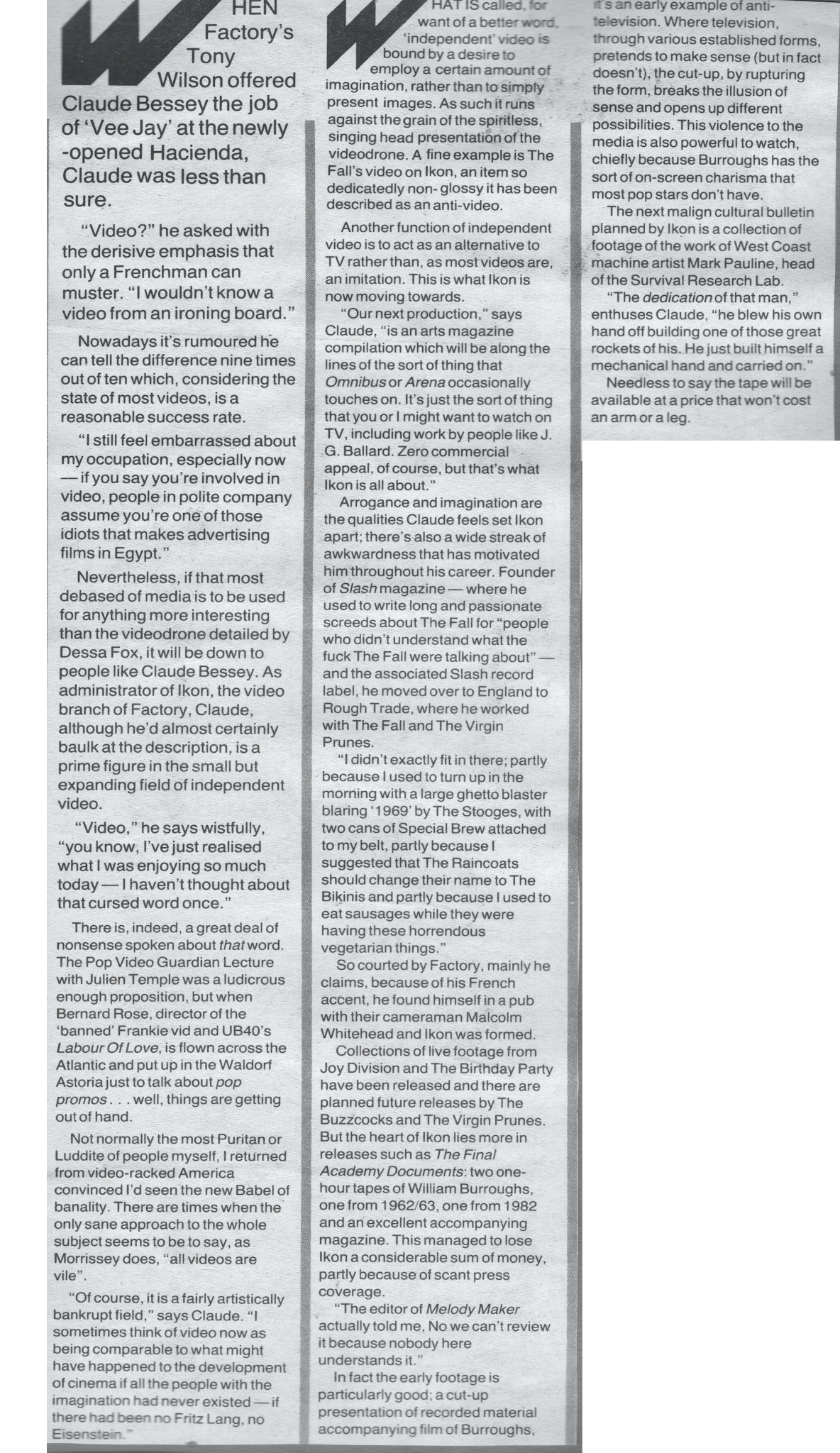Claude Bessey
WHEN Factory’s Tony Wilson offered Claude Bessey the job of 'Vee Jay’ at the newly-opened Hacienda, Claude was less than sure
“Video?” he asked with the derisive emphasis that only a Frenchman can muster. “I wouldn’t know a video from an ironing board.”
Nowadays it’s rumoured he can tell the difference nine times out of ten which, considering the state of most videos, is a reasonable success rate.
“I still feel embarrassed about my occupation, especially now — if you say you’re involved in video, people in polite company assume you’re one of those idiots that makes advertising films in Egypt.”
Nevertheless, if that most debased of media is to be used for anything more interesting than the videodrone detailed by Dessa Fox, it will be down to people like Claude Bessey. As administrator of Ikon, the video branch of Factory, Claude, although he’d almost certainly baulk at the description, is a prime figure in the small but expanding field of independent video.
“Video,” he says wistfully, “you know, I’ve just realised what I was enjoying so much today - I haven’t thought about that cursed word once.”
There is, indeed, a great deal of nonsense spoken about that word. The Pop Video Guardian Lecture with Julien Temple was a ludicrous enough proposition, but when Bernard Rose, director of the ‘banned’ Frankie vid and UB40’s Labour Of Love, is flown across the Atlantic and put up in the Waldorf Astoria just to talk about pop promos. . .well, things are getting out of hand.
Not normally the most Puritan or Luddite of people myself, I returned from video-racked America convinced I’d seen the new Babel of banality. There are times when the only sane approach to the whole subject seems to be to say, as Morrissey does, “all videos are vile”.
“Of course, it is a fairly artistically bankrupt field,” says Claude. “I sometimes think of video now as being comparable to what might have happened to the development of cinema if all the people with the imagination had never existed — there had been no Fritz Lang, no Eisenstein."
WHAT IS called, for want of a better word, ‘independent' video is bound by a desire to employ a certain amount of imagination, rather than to simply present images. As such it runs against the grain of the spiritless, singing head presentation of the videodrone. A fine example is The Fall’s video on Ikon, an item so dedicatedly non-glossy it has been described as an anti-video.
Another function of independent video is to act as an alternative to TV rather than, as most videos are, an imitation. This is what Ikon is now moving towards.
“Our next production,” says Claude, “is an arts magazine compilation which will be along the lines of the sort of thing that Omnibus or Arena occasionally touches on. It’s just the sort of thing that you or I might want to watch on TV, including work by people like J. G. Ballard. Zero commercial appeal, of course, but that’s what Ikon is all about.”
Arrogance and imagination are the qualities Claude feels set Ikon apart; there’s also a wide streak of awkwardness that has motivated him throughout his career. Founder of Slash magazine - where he used to write long and passionate screeds about The Fall for “people who didn’t understand what the fuck The Fall were talking about” - and the associated Slash record label, he moved over to England to Rough Trade, where he worked with The Fall and The Virgin Prunes.
“I didn’t exactly fit in there; partly because I used to turn up in the morning with a large ghetto blaster blaring ‘1969’ by The Stooges, with two cans of Special Brew attached to my belt, partly because I suggested that The Raincoats should change their name to The Bikinis and partly because I used to eat sausages while they were having these horrendous vegetarian things.”
So courted by Factory, mainly he claims, because of his French accent, he found himself in a pub with their cameraman Malcolm Whitehead and Ikon was formed.
Collections of live footage from Joy Division and The Birthday Party have been released and there are planned future releases by The Buzzcocks and The Virgin Prunes. But the heart of Ikon lies more in releases such as The Final Academy Documents: two one-hour tapes of William Burroughs, one from 1962/63, one from 1982 and an excellent accompanying magazine. This managed to lose Ikon a considerable sum of money, partly because of scant press coverage.
“The editor of Melody Maker actually told me, No we can’t review it because nobody here understands it.”
In fact the early footage is particularly good; a cut-up presentation of recorded material accompanying film of Burroughs, it's an early example of anti-television. Where television, through various established forms, pretends to make sense (but in fact doesn’t), the cut-up, by rupturing the form, breaks the illusion of sense and opens up different possibilities. This violence to the media is also powerful to watch, chiefly because Burroughs has the sort of on-screen charisma that most pop stars don’t have.
The next malign cultural bulletin planned by Ikon is a collection of footage of the work of West Coast machine artist Mark Pauline, head of the Survival Research Lab.
“The dedication of that man,” enthuses Claude, “he blew his own hand off building one of those great rockets of his. He just built himself a mechanical hand and carried on.”
Needless to say the tape will be available at a price that won’t cost an arm or a leg.

Comments
Post a Comment